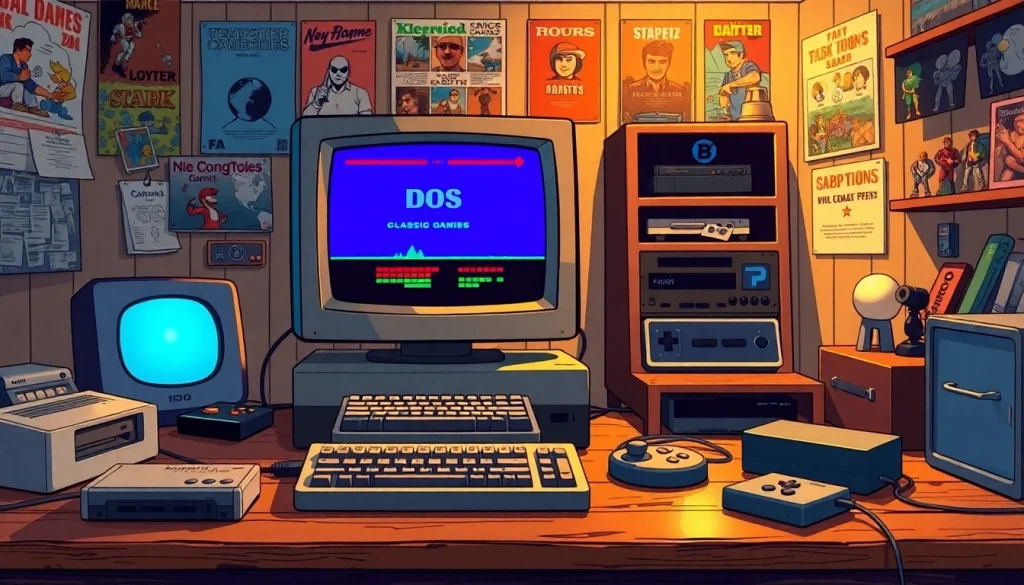How to Play DOS Games: A Comprehensive Guide for Retro Gaming Enthusiasts

Understanding DOS Games
What are DOS Games?
DOS games, short for Disk Operating System games, are titles that were predominantly designed for the MS-DOS operating system. Launched in the early 1980s, DOS became the platform of choice for many computer users, especially before the widespread adoption of graphical user interfaces. These games range from classic titles like Doom and Prince of Persia to elaborate adventure games and simulations. Their simplicity, coupled with engaging gameplay mechanics, has left an indelible mark on the gaming industry, garnering a devoted fan base even decades later.
The Historical Context of DOS Gaming
The rise of DOS games coincided with the revolution of personal computing. In the 1980s and 1990s, as personal computers became more accessible, developers seized the opportunity to create games that could run on these machines. The limitations of DOS, such as the lack of advanced graphics and sound, spurred creativity among developers, who had to innovate within the constraints of the platform. This era produced some of the most beloved games that defined genres and set the groundwork for future game development.
Popular Titles You Should Know
When exploring DOS games, several titles stand out not just for their popularity during their heyday but also for their lasting impact. Some essential classics include:
- Doom: A pioneering first-person shooter that revolutionized the gaming landscape.
- Prince of Persia: A groundbreaking platformer recognized for its fluid animation and engaging gameplay.
- Leisure Suit Larry: A humorous adventure game known for its witty writing and adult humor.
- SimCity: A city-building simulation game that launched numerous sequels and inspired countless players.
Getting Started with DOS Emulators
Choosing the Right DOS Emulator for Your Needs
Emulators are software that replicate the hardware and software environments of a different computing system, allowing you to play DOS games on modern operating systems. Several DOS emulators are available, each with its features and compatibilities. Some of the most popular include:
- DOSBox: This is the most widely used DOS emulator, known for its ease of use and wide range of compatibility with DOS games.
- eXoDOS: A comprehensive front-end for DOSBox that contains thousands of classic games, making it a favorite for retro enthusiasts.
- DOSEMU: A Linux-based option that allows DOS games to run on Linux systems.
Setting Up Your Emulator for Optimal Performance
Setting up your emulator to optimize performance can significantly enhance your gaming experience. Begin by installing the emulator of your choice, following the specific instructions provided on their official website. Here are some general tips for setup:
- Adjust the CPU cycles: Most emulators allow you to increase the CPU cycles, which typically enhances the speed of games.
- Configure graphics settings: Experiment with different graphics settings to find what works best for each game, including scaling and resolution options.
- Enable sound: Ensure that sound is properly configured in your emulator settings to fully appreciate the game’s audio experience.
Common Troubleshooting Tips
While playing DOS games via emulators, you may encounter issues. Here are common problems followed by their solutions:
- Game won’t start: Ensure you have the correct game files and that they are located in the correct directory.
- Slow performance: If the game is running too slowly, try increasing the CPU cycles in your emulator settings.
- Sound issues: Check your emulator sound settings. Sometimes, using different sound samples can improve audio performance.
play dos games
Downloading and Installing DOS Games
Where to Legally Acquire DOS Games
With nostalgic interest in DOS games surging, various platforms allow you to obtain these titles legally:
- Abandonware sites: Some older games that are no longer sold by their developers may be available on abandonware sites. However, legality can vary, so be cautious.
- GOG.com: This platform frequently sells classic DOS titles optimized for modern systems.
- Steam: A reliable database for digital distribution that includes many classic titles.
Step-by-Step Installation Guides
To play DOS games, you need to install them correctly on your chosen emulator. Here are general steps for installation:
- Download your chosen DOS game files.
- Extract the game files to a designated folder on your computer.
- Open your DOS emulator and configure it to point to the location of your game files.
- Launch the game through the emulator interface, following any specific commands if necessary.
Managing Game Files and Settings
Managing your DOS game files efficiently will help enhance your gaming experience. Consider the following practices:
- Create separate folders for each game to keep files organized.
- Maintain backup copies for essential game files, especially if they are rare or hard to find.
- Track any changes made in the emulator settings to ensure consistent performance across different games.
Enhancing Your DOS Gaming Experience
Configuring Graphics and Sound Settings
Enhancing your graphics and sound settings can dramatically improve the way DOS games look and sound. Here’s how to optimize these settings:
- Explore graphical configurations in your emulator settings, enabling options like fullscreen mode and aspect ratio adjustments.
- Utilize external graphics packs if available for specific games to enhance visual quality.
- For sound, experiment with different audio drivers available in your emulator settings to find the one that best suits your preferences.
Using Mods and Community Additions
The DOS gaming community is vibrant and active, often creating mods that enhance or completely change the gaming experience. Some ways to utilize mods include:
- Researching popular mods for your favorite titles, which can offer everything from graphical enhancements to gameplay changes.
- Joining forums or groups focused on specific games where modding is discussed to gain insights and downloads.
- Always ensure compatibility: Some mods may only work effectively with specific versions of the original game.
Connecting with Other DOS Gamers
Connecting with other DOS gamers can enhance your experience. Consider joining online forums, social media groups, or Discord channels dedicated to retro gaming. Here are some benefits of engaging with the community:
- Access to a wealth of information, including tips and recommendations for lesser-known games.
- Opportunities to share experiences, discuss favorite titles, and ask for troubleshooting help.
- Participating in community events or multiplayer gaming sessions to further enjoy your favorite DOS titles.
Preserving the Legacy of DOS Games
Understanding the Importance of Game Preservation
Preserving DOS games is crucial for maintaining the history and cultural significance of gaming. As technology evolves rapidly, many classic titles risk being forgotten or lost altogether. Acknowledging this importance inspires enthusiasts to advocate for the preservation of both the software and the hardware initially used to run these games. This effort ensures that future generations can access and enjoy the games that shaped the industry.
How to Back Up Your DOS Game Collection
Backing up your DOS game collection is essential for protecting against data loss. Here are steps to efficiently back up your collection:
- Create a dedicated storage solution, such as an external hard drive or cloud storage, specifically for your games.
- Regularly update your backups whenever you acquire new games or make changes to your collection.
- Organize your backups logically, mirroring the structure of your main game folders for easy retrieval.
Joining the DOS Gaming Community for Support
The DOS gaming community can be an invaluable resource for support, knowledge, and camaraderie. Engaging with like-minded individuals can provide:
- Access to troubleshooting advice for common emulator and DOS game issues.
- Knowledge sharing on game strategies, including tips for difficult sections in well-loved titles.
- Camaraderie through organizing retro gaming meet-ups or online gaming sessions.







